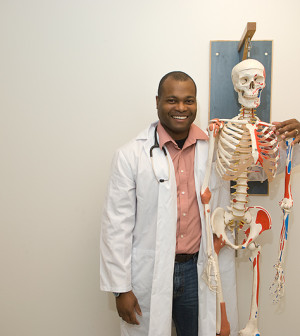- Gelatin vs. Collagen: Which is Best for Skin, Nails, and Joints?
- The Long-Term Effects of Daily Turmeric Supplements on Liver Health
- Could Your Grocery Store Meat Be Causing Recurring UTIs?
- Are You Making This Expensive Thermostat Error This Winter?
- Recognizing the Signs of Hypothyroidism
- 10 Strategies to Overcome Insomnia
- Could Artificial Sweeteners Be Aging the Brain Faster?
- Techniques for Soothing Your Nervous System
- Does the Water in Your House Smell Funny? Here’s Why
- Can a Daily Dose of Apple Cider Vinegar Actually Aid Weight Loss?
Study Casts Doubt on Acetaminophen for Low Back Pain, Arthritis


(HealthDay News) — Acetaminophen — best known as Tylenol in the United States — does not appear to help ease lower back pain and offers little relief for the most common form of arthritis, according to a new report.
The review of data from 13 studies could challenge existing recommendations on pain relief, experts say.
“These results support the reconsideration of recommendations to use [acetaminophen] for patients” with these conditions, concluded a team led by Gustavo Machado of The George Institute for Global Health at the University of Sydney in Australia.
The researchers analyzed 10 studies that examined the use of acetaminophen to treat osteoarthritis of the hip or knee, and three studies that assessed the use of the painkiller for lower back pain.
Osteoarthritis — the most common form of arthritis — and back pain are among the leading causes of disability worldwide, the researchers said. Current clinical guidelines recommend acetaminophen as the first-line drug treatment for both conditions.
However, doubts about the effectiveness of the drug in treating the conditions, and concerns about the safety of the recommended full dose (up to 4,000 milligrams a day), have made those guidelines controversial, Machado’s team said.
Looking at the pooled data, the investigators found that for people with lower back pain, acetaminophen was ineffective in either reducing patient disability or enhancing quality of life.
In people with osteoarthritis of the hip or knee, acetaminophen provided only a small, not clinically important benefit in the reduction of pain and disability, the study found.
McNeil Consumer Healthcare, the maker of Tylenol, countered that acetaminophen has a long history of effectiveness.
In a statement, the company said that before clinical guidelines are changed, “it is important to comprehensively look at the body of evidence . . . The safety and efficacy profile of acetaminophen is supported by more than 150 studies over the past 50 years.”
And one U.S. expert also urged caution.
“Part of the problem of comparing many trials is the benefit to an individual patient is lost,” said Dr. Houman Danesh, director of integrative pain management at Mount Sinai School of Medicine in New York City.
“Back pain is a multifactorial process — if the patient has musculoskeletal imbalances which cause the pain, the treatment differs than if they have arthritis, or improper shoe support, or back pain that is caused from a herniated disc,” Danesh explained. “Lumping these and other diagnoses into an all-inclusive label of ‘back pain’ is not recommended in treating the patient.”
Dr. Allyson Shrikande is a physiatrist — an expert in physical rehabilitation — at Lenox Hill Hospital in New York City. She said that there are also non-drug options for treating pain.
“Strengthening exercises have been shown to decrease pain in knee osteoarthritis,” Shrikande noted. “Physicians often prescribe Tylenol or other oral medications as first-line treatment, but perhaps an individually tailored physical therapy program should be tried prior to the use of Tylenol or other oral pain medications.”
Danesh agreed that pills are not always necessary. In fact, “this [new] study does suggest that other methods — such as acupuncture, smoking cessation, weight loss, physical activity and proper ergonomics at our work stations — may have an equal role to [acetaminophen] in treating back pain,” he said.
Safety issues may also come into play. In an accompanying journal editorial, Christian Mallen and Elaine Hay of Keele University in England, wrote that the study “reopens the debate” about the effectiveness and safety of acetaminophen.
However, they said that if acetaminophen was removed from existing treatment guidelines for lower back pain and arthritis, there could be an increase in the use of other drugs, such as powerful, often addictive narcotic painkillers.
The findings were published March 31 in the journal BMJ.
More information
The U.S. National Library of Medicine has more about acetaminophen.
Source: HealthDay
Copyright © 2026 HealthDay. All rights reserved.










